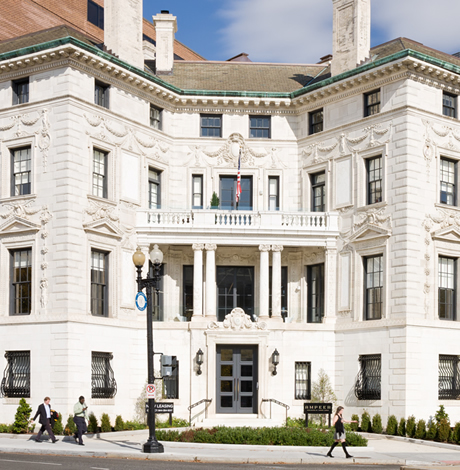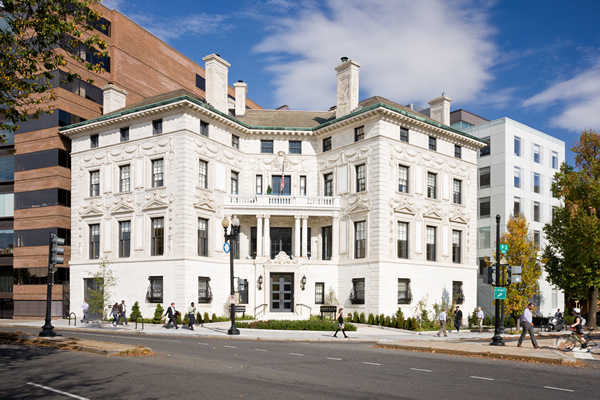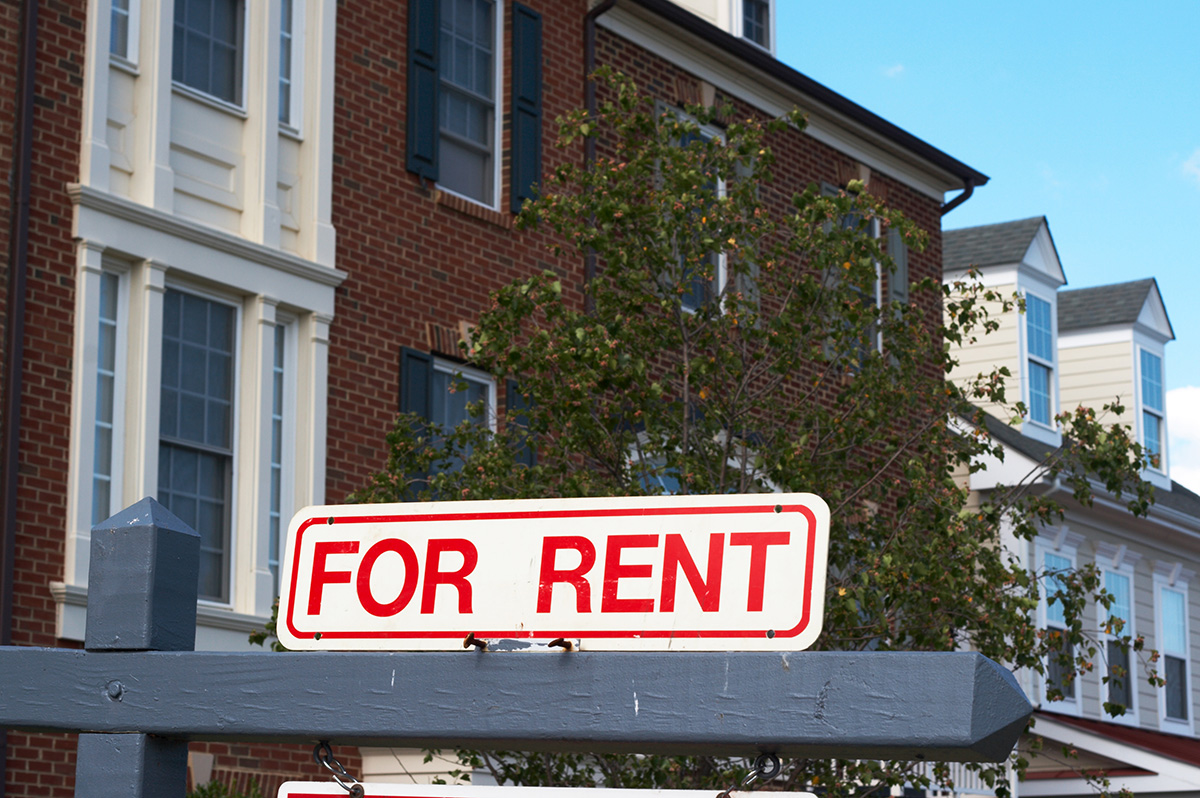Real Estate
Inside a short-term luxury living arrangement
Ampeer Residences offers 92 furnished units in Dupont


Ampeer Residences offers complimentary breakfast and happy hours, among other amenities. (Photo courtesy Ampeer)
Nontraditional residential developments are increasingly becoming popular choices for renters in the Greater Washington D.C. metro area. Modern short-term living arrangements provide a unique option for residents by incorporating five-star amenities, like fully furnished units, onsite housekeeping, and complimentary food and drinks, paired with a high-end apartment lifestyle of flexible lease terms and included utilities.
Intrigued? Look no further than Dupont Circle for an option in the newly redeveloped building, Ampeer Dupont Circle. Ampeer accommodates 92 fully furnished studio and one-bedroom units with lease terms ranging from 1 to 12 months, designed for the highly mobile professional. The property began leasing in July of 2017 and is nearly at full capacity for the summer.
So, why are these living arrangements becoming increasingly popular? Here are just a few reasons people are turning to short-term, flexible accommodations:
Increase in Remote Working
The career landscape has changed drastically over the last several years with employers offering more remote work opportunities. According to a Gallup survey, 43 percent of employed Americans spent time working remotely in 2016, which represented a four percent increase since 2012. This direct effect is continuing to create a demand for short-term leasing and flexible accommodations where employees can work from one destination to the next. Move-in ready apartments are especially appealing, allowing professionals working long hours to focus on projects versus juggling calls and appointments with cable and internet vendors.
In D.C., especially, the target for this option is certainly the diplomatic community, employees within the State Department, the Department of Treasury, other executive branches, as well as people that are transient.
The work lifestyle of the younger demographic is also a major factor to its popularity. Millennials and the Gen Y workforce are all-in on the mobile trend and do not find rigid and strict leases appealing.
Hospitable Amenities
Staying in a hotel for several months can get expensive quickly, and a room arranged through Airbnb certainly doesn’t accommodate turndown services. There is also something to be said about staying somewhere that feels like your own. So, it’s no surprise that a short-term apartment can be the ideal choice.
Ampeer, for example, offers a suite of perks to their residents including complimentary breakfast and happy hours, secured internet and utilities, and optional laundry and housekeeping services. The neoclassical-style manor also provides several common areas including a restored ballroom, a kitchen/dining room, a fitness center, a library, and a courtyard.
And the units? They are all appointed with 300 thread-count bedsheets, Egyptian cotton towels, and Keurig coffee makers.
Immerse in Local Culture and Activities
Just like any hotel concierge service, a short-term apartment also offers activities and arranges exclusive opportunities that allow residents to enjoy the city’s culture in one way or another.
Ampeer Residences has an extra historical flair than most since the building was originally called The Patterson Mansion — named after socialite Eleanor “Cissy” Patterson’s family — and was constructed in the early 20th century. For the recent renovation, the developers hired renowned D.C. designer, Darryl Carter, to re-imagine the common areas where regular resident activities are being held all summer long, including live musical performances, wine tastings, and cultural speaking events.
Ampeer also snagged the most coveted tickets in town to hold a contest to attend Hamilton: An American Musical at The John F. Kennedy Center for the Performing Arts, as well as a free two-night stay at the residences (the contest is still live on their social media channels if you’re interested in entering).
With all that the short-term apartment lifestyle offers, it is understandable why these accommodations are trending. If you’re interested in checking out this option, many buildings offer personal tours or allow potential residents to attend upcoming events to experience what life is like for their residents.
Ampeer Residences is a short-term, fully furnished luxury residence built around a legacy of style and simplicity combined with activated luxury living space. Residents can choose from appointed studios and one bedrooms in either the grand mansion or modern new tower. Rent includes utilities, cable and internet, food and drink offerings — group breakfasts, happy hours — and other social programs. The mansion’s common areas include a cocktail bar in the original ballroom, a study and library, and a shared kitchen. These areas are also intended to host social gatherings and events for members. For more information about Ampeer, please visit AmpeerResidences.com.
Real Estate
Navigating DMV real estate market during political unrest
Reductions in federal employment have introduced uncertainties

The Washington, D.C.-Maryland-Virginia (DMV) region has long been recognized for its robust housing market, underpinned by the presence of the federal government and a diverse economic landscape. Recent massive reductions in federal employment have introduced uncertainties, yet the area continues to offer compelling reasons for prospective homebuyers, particularly within diverse communities.
While the federal government has traditionally been a significant employer in the DMV, the region has proactively diversified its economic base. Sectors such as technology, professional services, education, and healthcare have expanded, mitigating the impact of federal job cuts. This diversification fosters some economic resilience, which offers our area a semblance of protection against the impending unknowns that we currently face. Nothing can shield real estate entirely; however, our area tends to survive these types of changes better than other parts of the country.
Despite concerns over federal layoffs, the DMV housing market has demonstrated notable stability. Analyses indicate that the number of active listings, sold properties, and median sales prices have remained steady on a year-over-year basis. This steadiness suggests that the market is adapting to changes without significant disruption.
Furthermore, while there has been a slight increase in home listings, this trend aligns with typical seasonal variations and does not solely reflect federal employment changes. The luxury property segment, in particular, continues to thrive, indicating sustained interest and investment in the region.
The DMV region is renowned for its cultural and demographic diversity, with areas like Montgomery County, Md., being among the most ethnically diverse in the nation. This inclusivity extends to various communities, including LGBTQ individuals, fostering a welcoming environment that enhances the area’s appeal. Even though the current administration is fostering anti-diversity ideology, I remain confident that our LGBTQ community will continue to thrive even as these destructive forces work against us.
Local governments within the DMV have implemented policies aimed at promoting affordable housing and preventing displacement, particularly in the wake of economic shifts. Initiatives like the Douglass Community Land Trust in Washington, D.C., exemplify efforts to maintain housing affordability and support community stability.
Additionally, jurisdictions such as Montgomery County have longstanding Moderately Priced Dwelling Unit (MPDU) programs that require developers to include affordable housing in new residential developments. These policies contribute to socioeconomically mixed neighborhoods, benefiting diverse populations.
Despite Elon Musk’s brandishing of a chainsaw to the federal workforce, our real estate market continues to thrive. The DMV region maintains its appeal. Economic diversification, market stability, commitment to diversity and inclusion, and progressive housing policies collectively contribute to an environment that supports and attracts diverse communities. Prospective homebuyers can find reassurance in the region’s resilience and ongoing efforts to foster an inclusive and vibrant community. These are only a few among the many reasons to have a positive outlook while considering real estate options in our area.
It is important to consider working with brokerages, brokers, agents, lenders and title companies who align with our community and our objectives. Not all LGBTQ agents work for brokerages that support or understand the needs of the members of our community. Do your research and find out who has donated money to what political causes. Now more than ever we must support members of our community to protect our way of life and our very existence.
Stacey Williams-Zeiger is president/principal broker of Zeiger Realty Inc. Reach her at [email protected].

Whether you are upgrading parts of your current home to prepare it for sale or enhancing the home you just purchased, kitchens and bathrooms are still at the top of the renovation list.
Kitchen renovations have always embraced a blend of functionality, personalization, and aesthetic appeal; however, homeowners are currently moving away from sterile, uniform designs, opting instead for spaces that reflect warmth, character, and individual style. Here are some of the most prominent trends shaping kitchen renovations this year.
Warm and Earthy Tones
The dominance of all-white kitchens is waning as homeowners gravitate toward warmer, earth-toned palettes. Shades like sage green, navy blue, and natural wood finishes are becoming popular choices for cabinetry, infusing kitchens with a cozy and inviting atmosphere. This shift reflects a desire for spaces that feel more personalized and less clinical. Flat panel and Shaker cabinets continue to be popular options.
Integration of Organic Modernism
The “modern organic” style is gaining traction, characterized by using natural materials, neutral color palettes, and serene layouts. Incorporating elements like soapstone countertops, Venetian plaster walls, slate floors, and greenery not only enhances aesthetic appeal but can also increase home values significantly. Fully outfitted outdoor kitchens further contribute to this trend.
Innovative Kitchen Island Designs
Kitchen islands continue to be central features, with designs evolving to incorporate textures, wood and tile cladding, multifunctional elements, and bold colors and materials. Integrated seating areas, waterfall countertops, and the use of monolithic stone or stacked marble are becoming increasingly popular. These islands not only serve as functional workspaces but also as striking focal points within the kitchen.
Concealed Kitchens for a Sleek Look
The concept of concealed kitchens is on the rise, emphasizing built-in appliances, flush cabinetry, and appliance garages to maintain a clutter-free environment. This design approach fosters a minimalist aesthetic, creating a seamless flow between the kitchen and adjacent living areas, particularly in open-concept homes.
Personalized Cabinetry and Storage Solutions
Customization is key in modern kitchen designs, with homeowners seeking tailored storage solutions that cater to their specific needs. Features like hidden storage compartments, integrated lighting, and unique hardware choices are being favored over generic, cookie-cutter options. This trend underscores a move toward kitchens that are both functional and reflective of personal style.
Revival of Traditional Styles with Modern Twists
Traditional kitchen styles are making a comeback, with a contemporary twist. Elements such as expanded backsplash coverage, classic tile shapes and patterns, use of mixed metals, and specialty appliances are being integrated into modern kitchens, blending the charm of the past with the conveniences of the present. Custom range hoods, coffee bars and microwave drawers are increasingly added to renovation projects. This fusion creates spaces that are both timeless and equipped for modern living.
Sustainable and Natural Materials
Sustainability remains a priority, with an increased use of eco-friendly materials like reclaimed wood, recycled metals and glass, and energy-efficient appliances. This not only reduces environmental impact but also introduces unique texture and shimmer into kitchen designs, adding depth and character to the space.
Use of Bold Colors and Accents
Homeowners are becoming more adventurous with color and texture, incorporating vibrant hues and tactile materials into their kitchen designs. Features like colorful window trims, two-tone cabinets, and the use of wallpaper and feature walls add visual interest and a personalized touch to the space. In addition to the familiar white, major appliances are now shown in matte black, navy, and jewel tones of red, green, and blue. There are even vinyl wraps and magnet covers that allow for more creativity and individualization with appliances.
Integration of Smart Technology
The incorporation of smart technology continues to grow, with appliances featuring automated cooking functions, sensor reheating, and control locks becoming more prevalent. Induction stoves are entering the mix. Charging stations and touch-activated cabinet doors and faucets are also popular. LED lighting lasts longer and prevents you from having to climb a ladder to change lightbulbs on a high or vaulted ceiling. These advancements enhance convenience and efficiency, aligning with the modern homeowner’s desire for a kitchen that supports a tech-savvy and busy lifestyle.
Multifunctional Spaces
Kitchens are increasingly being designed as multifunctional spaces that accommodate cooking, dining, working, and socializing. This has led to the inclusion of features like integrated seating, versatile lighting, and adaptable layouts that can easily transition between different uses, reflecting the evolving role of the kitchen in contemporary homes. Still, don’t be surprised to see a resurgence of self-contained kitchens with real walls.
So, whether the kitchen you want is sleek and modern, earthy and organic, or traditional and elegant, there will always be fresh new styles, ideas, innovations and classic touches that cater to your lifestyle.
Valerie M. Blake is a licensed Associate Broker in D.C., Maryland, and Virginia with RLAH @properties. Call or text her at 202-246-8602, email her via DCHomeQuest.com, or follow her on Facebook at TheRealst8ofAffairs.

Spring is the season of renewal—a time to refresh, declutter, and make space for better things. But spring cleaning isn’t just for your home. Whether you’re a landlord or a tenant, it’s the perfect opportunity to reassess your rental relationship.
Are landlords feeling disconnected from tenants? Are tenants feeling like their landlord is absent? Before considering drastic steps like moving, both sides can take positive, proactive measures to improve communication, set clearer expectations, and foster a mutually beneficial relationship. This article encourages both landlords and tenants to take stock of their rental experiences and explore ways to clean up misunderstandings before they become deal-breakers.
1. Dust Off the Lease: Revisit Foundation of Your Relationship
The lease is the roadmap of your rental journey. Are both sides following it?
For Landlords:
• Review Key Terms: Ensure you fully understand your obligations under the lease and DC law, including maintaining a habitable unit, providing essential services like heat and water, and ensuring repairs are done for safety compliance.
• Clarify Expectations: Is there a disconnect between your expectations per the lease and what you are observing at the rental? Remind tenants of areas that are covered in the lease in a proactive and positive manner to make sure all are on the same page.
• Mid-Lease Check-Ins: A casual mid-lease meeting or email can clarify expectations and correct misunderstandings or interpretations of responsibilities before they become issues.
For Tenants:
• Understand Your Rights and Responsibilities: Review your lease to see what your landlord is required to provide. In DC, landlords must ensure safe, habitable living conditions, but cosmetic changes or upgrades are not guaranteed, unless specified in the lease.
• Know What’s Reasonable: Yes, you have a suite of rights in the District of Columbia which must be respected. Certain societal expectations may not be realistic if they weren’t part of the original agreement. You can always request improvements that are not required of the landlord, but be prepared to respectfully accept the outcome if the response is “No”.
• Proactive Communication: If you have concerns about your rental, present them as collaborative questions. For example, “I noticed X—how would you like for me to address this?”
2. Declutter Communication Channels
Miscommunication is often the root of rental frustrations. Let’s clean that up.
For Landlords:
• Preferred Methods of Communication: Are you providing clear ways for tenants to reach you? Ensure you’re responsive to emails, phone calls, or portal messages.
• Seasonal Reminders: Proactive messages about maintenance (e.g. start cutting the grass, apply pre-emergent weed control, etc) can reduce escalations later.
• Feedback Opportunities: Invite tenants to share concerns in a structured manner—perhaps a quarterly email check-in.
For Tenants:
• Respectful Clarity: When reaching out, be specific about your needs. Instead of “the heater isn’t working,” try “the heater hasn’t been turning on in the evenings and only blows cold air. Could someone check it this week?”
• Understanding Response Times: Some complex issues take longer to resolve. Remain reasonable on expectations and consider the explanations for delays. Understanding that cosmetic concerns may not be prioritized can also help.
• Log Your Communications: Keep a record of all major discussions for clarity and protection.
3. Polish the Relationship: Turn Good Experiences into Great Ones
Small efforts can shine a spotlight on the positive areas in your rental relationship.
For Landlords:
• Recognize Good Tenants: Expressing appreciation for on-time rent payments or good upkeep fosters goodwill.
• Offer Incentives: Small gestures like discounted renewal rates or minor upgrades can encourage long-term, responsible tenants.
• Educational Resources: Provide additional information on how your tenants can maintain aspects of the home, such as garbage disposal care or HVAC filter changes.
For Tenants:
• Be a Proactive Renter: Report maintenance issues promptly and keep the property clean and damage-free. Execute routine maintenance that is your responsibility, such as changing out air filters reliably.
• Community Mindset: Participate in neighborhood events or property meetings, which can strengthen your relationship with the landlord.
• Extend Courtesy: Flexibility with maintenance schedules and clear communication during repairs make things smoother for everyone.
4. Freshen Up Expectations: Reset Standards for Healthier Relationship
Spring is the perfect time to hit the reset button.
For Landlords:
• Collaborate on Solutions: If there are tenant issues (e.g., noise complaints), approach them with a solutions-oriented mindset.
• Transparency with Changes: If rent adjustments are necessary, provide clear explanations and as much notice as possible.
• Renewal Conversations: Discuss future plans early to avoid surprises at lease-end.
For Tenants:
• Understand Market Realities: Rising costs may mean rent increases. Assess whether your current rental still fits your budget and needs.
• Negotiate Thoughtfully: If requesting upgrades or improvements, frame them as benefits for both sides.
• Express Gratitude: A little appreciation can go a long way—thank your landlord for prompt repairs or responsiveness.
5. Knowing When to Move On
Sometimes, despite best efforts, it’s time for a change—but separation can still be positive.
For Landlords:
• Identify Red Flags: Consistent late payments, damage, or lease violations may necessitate initiating a conversation about a potential move for the tenant.
• Follow DC Regulations: The District of Columbia has strict tenant protection laws. Always provide proper notices and follow legal protocols to avoid complications.
• Exit with Professionalism: Treat the end of a lease as a business transition—keep emotions in check and document all steps.
For Tenants:
• Know When It’s Time to Go: If safety, habitability, or repeated issues aren’t resolved despite your best efforts, it may be time to move on.
• Provide Proper Notice: Adhere to lease terms regarding notice periods and leave the property in good condition.
• Leave on Good Terms: Positive references from previous landlords can make applying for future rentals more successful.
Conclusion: Spring Forward, Together
A little spring cleaning in your rental relationship can make a world of difference. For landlords, it’s about resetting expectations, enhancing communication, and retaining good tenants. For tenants, it’s about understanding your rights, being proactive, and collaborating for a better living experience. By refreshing how both sides approach the relationship, you can avoid unnecessary turnover and create a rental experience whereall parties can thrive. After all, sometimes a little tidying up is all it takes for a rental relationship to blossom anew.
Scott Bloom is owner and senior property manager at Columbia Property Management. For more information and resources, go to ColumbiaPM.com
-

 The White House5 days ago
The White House5 days agoWhite House does not ‘respond’ to reporters’ requests with pronouns included
-

 District of Columbia2 days ago
District of Columbia2 days agoReenactment of 1965 gay rights protest at White House set for April 17
-

 Hungary2 days ago
Hungary2 days agoHungarian MPs amend constitution to ban public LGBTQ events
-

 Maryland2 days ago
Maryland2 days agoFreeState Justice: Transgender activist ‘hijacked’ Moore’s Transgender Day of Visibility event












